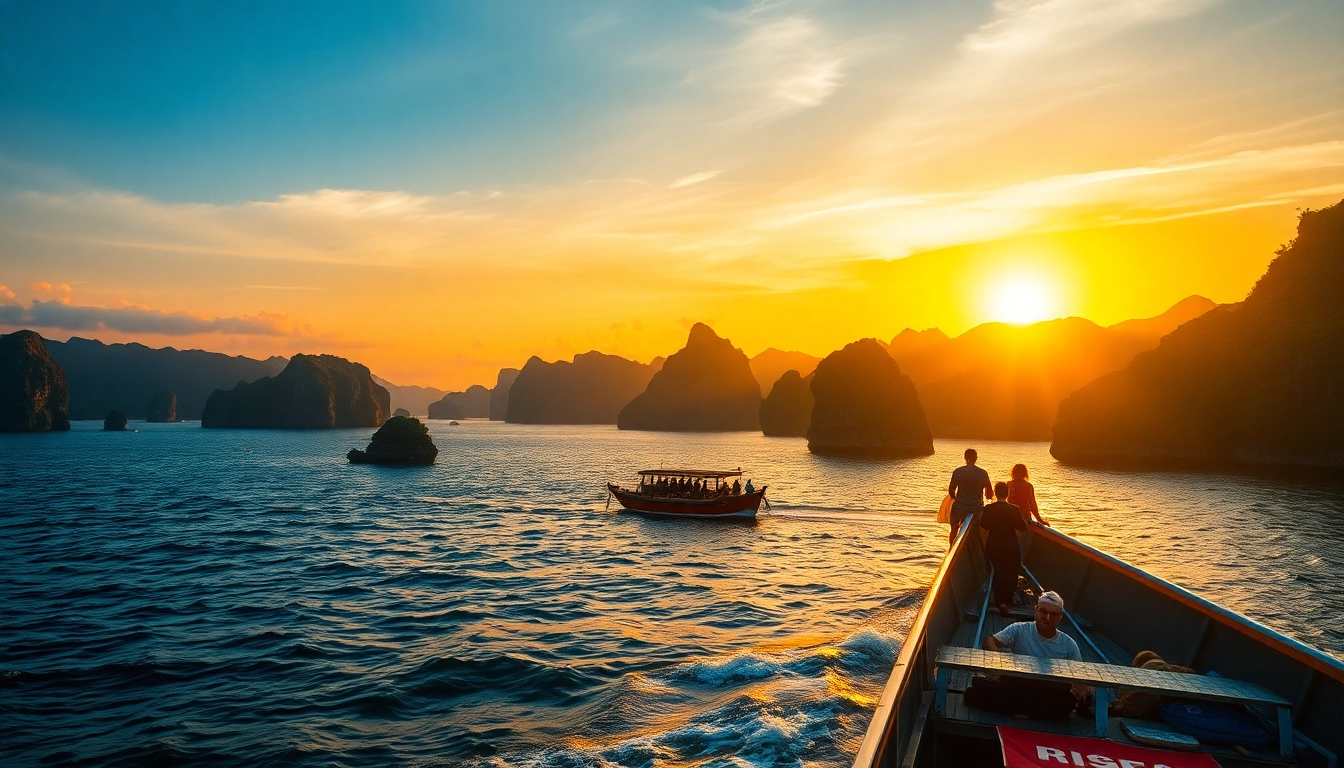Understanding the Basics of a Tour: Definition and Types
In the world of travel and leisure, a tour represents an organized journey that encompasses multiple destinations or activities, typically undertaken for enjoyment, exploration, or cultural enrichment. Unlike solitary travel, a tour involves a curated itinerary, often with the assistance of professional operators, ensuring travelers experience the best a given destination has to offer without the stress of planning every detail independently. This structured approach allows tourists to delve deeply into local cultures, explore new sights, and connect with fellow travelers, all while enjoying the safety and convenience of guided experience.
The core of a tour lies in its ability to streamline travel logistics—covering transportation, accommodation, meals, and activities—thus offering a seamless journey. For travelers venturing into regions like Indonesia, a country famed for its diverse culture and breathtaking landscapes, choosing the right type of tour can dramatically enhance the experience and value derived from the trip. Understanding what constitutes a tour and the different types available is foundational to crafting an unforgettable travel adventure.
What Constitutes a Tour in Travel Planning
At its essence, a tour combines multiple elements: transportation (such as buses, trains, or boats), lodging, guided excursions, and sometimes meals and entertainment. It’s characterized by its organized nature, often led by a professional tour guide or agency that ensures travelers follow a defined route and schedule. The primary goal is to maximize exposure to key sights and cultural experiences within a fixed timeframe, making the most of a traveler’s limited time and resources.
A typical tour begins with careful planning, which involves designing a route that balances popular attractions, cultural immersion, and free time for personal exploration. Whether it’s a day trip or a multi-week expedition, the fundamental attributes remain: organization, guided support, and a set itinerary. Tour operators also handle the logistical details such as booking accommodations and tickets, so travelers can focus solely on enjoying their journey.
In Indonesia, a country renowned for its island paradise landscapes and rich traditions, tours are often designed to highlight specific regions or themes—such as cultural tours in Bali, adventure trips in Lombok, or wildlife excursions in Komodo. The comprehensive nature of a tour minimizes the hassles often associated with independent travel, providing a structured, enriching experience.
Different Types of Tours Available in Indonesia
Indonesia offers a broad spectrum of tour options, tailored to various interests, budgets, and travel styles. Here are some of the most prevalent categories:
- Cultural Tours: Explore the rich heritage of Indonesia through visits to temples, traditional villages, and cultural performances. Places like Yogyakarta and Bali are centers for such immersive experiences.
- Adventure Tours: Include activities such as trekking, surfing, diving, and mountaineering. Lombok’s Rinjani volcano and Raja Ampat’s coral reefs are prime destinations.
- Wildlife and Nature Tours: Focused on observing Indonesia’s diverse flora and fauna, such as orangutans in Borneo or Komodo dragons in Komodo Island.
- Beach and Resort Tours: Designed around relaxing on pristine beaches, often combined with water sports and spa experiences, perfect for leisure travelers.
- Eco and Sustainable Tours: Emphasize responsible travel by engaging with local communities and conservation projects.
Each tour type is crafted to provide unique insights and experiences, catering to different traveler preferences. Choosing the appropriate tour involves assessing personal interests, physical fitness, and desired engagement level with local cultures and environments.
Choosing the Right Tour for Your Interests
Selecting the ideal tour hinges on aligning your travel aspirations with the available options. Here are guiding principles to aid your decision:
- Identify Your Goals: Are you seeking cultural immersion, adventure, relaxation, or wildlife encounters? Clarify your priorities.
- Assess Your Fitness Level: Some tours involve physical activities like hiking or diving. Ensure the difficulty level matches your physical condition.
- Consider Time and Budget: Longer, premium tours tend to cost more but offer extensive experiences. Shorter or budget-friendly options can still provide rich insights.
- Research Tour Operators: Look for reputable agencies with positive reviews, certified guides, and clear itineraries.
For example, a cultural tour in Bali emphasizing temple visits and traditional dance showcases may attract history enthusiasts, whereas an adventure trekking tour in Lombok appeals to thrill-seekers. By understanding personal preferences, travelers can tailor their choices for maximum satisfaction.
Planning Your Tour: Tips and Best Practices
Budgeting and Cost Optimization
Effective financial planning is crucial to ensure a memorable yet affordable tour. Start by setting a clear budget that includes all aspects—transportation, accommodation, meals, entrance fees, and optional excursions. Comparing different tour packages can reveal cost savings, especially when booking in advance or during off-peak seasons.
In Indonesia, some tours include all-inclusive pricing, while others charge per service. Choosing packages from trusted operators like Golden Rama Tours & Travel can often yield better deals. Additionally, travelers should consider local costs—such as street food versus dining at tourist restaurants—and leverage local transportation options.
Economizing doesn’t mean sacrificing quality; it often involves selecting smaller group tours, staying in guesthouses instead of hotels, or opting for half-day excursions. Planning ahead, setting priorities, and being flexible on dates can significantly reduce expenses.
Selecting Reliable Tour Operators in Indonesia
The success of a tour largely depends on the quality and reliability of the operator. When choosing a tour company, consider factors such as accreditation, reviews, and staff expertise. Certifications from national tourism boards and international travel associations are good indicators of credibility.
Trusted operators in Indonesia often provide comprehensive itineraries, clear communication, and excellent customer support. For example, agencies like Dwidaya Tour and Angkasa Tour & Travel offer a wide range of options backed by positive traveler feedback.
Verify inclusions, cancellation policies, and whether guides are knowledgeable and local. Reliable operators also prioritize safety measures and environmental responsibility.
Timing and Seasonal Considerations
The timing of your tour significantly impacts the experience. Indonesia’s diverse climate means that certain regions are best visited during specific seasons. For example, the dry season (May to September) generally offers better conditions for beach, trekking, and outdoor activities, whereas the rainy season (October to April) might be more suited for cultural explorations and rice terrace sightseeing.
Festivals and local events also influence timing—attending Bali’s Nyepi Day or Java’s Sekaten festival can add cultural richness. Additionally, visiting during shoulder seasons can alleviate crowds and reduce costs.
Planning well in advance ensures availability of preferred tours and accommodations. Consult local weather charts and be adaptable to unexpected weather patterns for a smoother experience.
Enhancing Your Tour Experience with Local Engagement
Interacting with Local Communities and Culture
A meaningful tour extends beyond sightseeing—engaging with local communities enriches the experience deeply. Participate in traditional craft workshops, attend cultural performances, or dine with local families. Such interactions foster mutual understanding and support sustainable tourism.
Respect local customs, dress modestly where appropriate, and learn basic language phrases—these small efforts open doors to authentic exchanges. Many Indonesian tours partner with community-based organizations, allowing travelers to contribute positively and leave a lasting impact.
Must-Visit Destinations on Indonesian Tours
Indonesia’s vast archipelago offers countless sites worth exploring. Notable destinations include:
- Bali: The Island of the Gods, renowned for its temples, beaches, and vibrant arts scene.
- Famous for Mount Rinjani, pristine beaches, and traditional Sasak villages.
- Yogyakarta: Cultural hub with ancient temples like Borobudur and Prambanan.
- Komodo Island: Home to the legendary Komodo dragons and spectacular marine biodiversity.
- Raja Ampat: One of the world’s top diving destinations, with stunning coral reefs and marine life.
Authentic Food and Unique Experiences
Culinary exploration is integral to immersing in Indonesia’s diverse culture. Street foods like satay, gado-gado, and nasi goreng offer authentic flavors. Participating in local cooking classes or night markets provides a taste of regional specialties.
Unique experiences may include witnessing traditional ceremonies, learning batik-making in Java, or participating in agro-tourism projects. These activities provide a deeper connection with the local way of life and create memorable moments beyond standard sightseeing.
Measuring Tour Success and Safety
Tracking Your Tourism Experience and Feedback
After completing your tour, reflect on the experience to gauge satisfaction and areas for improvement. Maintain a travel journal, share reviews online, and provide constructive feedback to operators. Tracking your experiences helps future travelers and encourages high standards within the tourism industry.
Utilizing performance metrics such as adherence to the itinerary, guide professionalism, and overall value received enables a comprehensive assessment. Platforms like TripAdvisor, Google Reviews, or specialized travel blogs are excellent channels to share insights.
Safety Tips for Tourists in Indonesia
Safety is paramount—be aware of local customs, health advisories, and environmental risks. Always carry necessary documents, avoid unsafe areas, and heed local guidance. Use reputable transportation, stay hydrated, and protect against sun exposure.
Emergency contacts for health and safety, awareness of potential scams, and securing travel insurance further protect travelers. Familiarize yourself with local laws and respect cultural sensitivities to ensure a smooth trip.
Planning for Flexibility and Unexpected Changes
Despite meticulous planning, unexpected events can arise—weather disruptions, transportation strikes, or health issues. Build flexibility into your itinerary, allocate buffer days, and maintain open communication with your tour guide or operator.
Having contingency plans, such as alternate activities or optional excursions, ensures that your tour remains enjoyable even when circumstances change unexpectedly. Staying adaptable and positive enhances your overall experience.
Advanced Tips for Frequent Tour Travelers
Leveraging Technology for Better Tours
Modern technology offers powerful tools to optimize travel experiences. Use travel apps for real-time updates, translations, and navigation. GPS-guided audio tours, digital itineraries, and social media communities help plan and customize trips.
Many tour operators now incorporate virtual reality previews or augmented reality guides to enrich the journey. Staying connected and well-informed ensures a smoother, more personalized experience.
Personalizing Your Tour Experiences
Elite travelers often customize tours to align closely with personal interests. Engage with operators to add unique activities, choose preferred accommodations, or extend certain visits. Private tours offer exclusivity and tailored pacing.
Building relationships with local guides and communities allows for insider access and authentic encounters. Personalization increases satisfaction and fosters meaningful connections.
Building a Travel Network and Future Tour Planning
Consistent tour travelers benefit from developing a network of contacts—fellow travelers, guides, and local operators. Maintaining digital and social connections facilitates repeat visits, exclusive offers, and insider tips.
Documenting past tours, noting preferences, and setting future goals help craft long-term travel plans. Regularly exploring new regions within Indonesia or nearby countries ensures continuous adventure and growth as a traveler.

